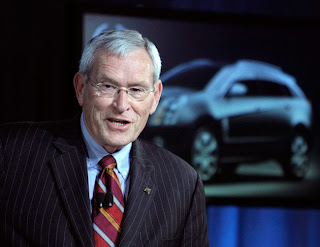The Detroit News
Traverse City -- General Motors CEO Edward Whitacre Jr. fired back at opponents of the government's rescue of the Detroit automakers, saying the criticism was "all political."
"People that voted against bailing us out, people who didn't want us to succeed are doing everything they can to keep us from it and taking shots, but, in spite of them, we're going to succeed," Whitacre said in a Detroit News interview ahead of a speech at the Center for Automotive Research's Management Briefing Seminars here. "You know who they are and I know who they are."
In recent months, a number of critics -- including Rep. Darrell Issa, R-Calif., Sen. Charles Grassley, R-Iowa, and others -- have been harshly critical of GM on a number of fronts, especially the decision to close hundreds of dealerships.
Issa said in a letter to Whitacre in April that GM "has come dangerously close to committing fraud and that you might have colluded with the U.S. Treasury to deceive the American public."
Issa objects to GM's ads that featured Whitacre touting the fact that GM "repaid our government loan in full, with interest, five years ahead of the original schedule."
At issue was the fact that GM received $50 billion in U.S. government bailout funds, but about $43 billion of those were swapped by the government in exchange for a 61 percent majority stake in GM.
Whitacre did acknowledge that GM could have done better in explaining it, but emphasized the ads weren't untruthful.
"We did make it clear that there's still an equity piece owned by the government, but we have paid the loan back and that's a big number," Whitacre said.
Arkansas Gov. Mike Huckabee told a newspaper last month that GM should have been allowed to die.
Whitacre also said he didn't know when the Treasury Department's pay restrictions for GM would end. GM is one of four companies subject to the oversight of a pay czar who approves pay for the top 25 executives.
"You can find an opinion all the way from when they owned zero stock to some percentage and I can't get an answer," Whitacre said. "There are no straight answers, but it is a royal pain to deal with."
The Treasury Department, in response to repeated questions from The Detroit News over the last six months, hasn't said when GM will escape oversight.
The restrictions -- which have limited some top executives to no more than $500,000 in cash salaries -- have hindered recruiting of outsiders to come to GM, Whitacre said.
GM sought to pay 16 of its top 25 executives more than $500,000, but special pay master Ken Feinberg approved it for only eight executives. Average cash salaries were cut 7.5 percent for the top 25 GM execs.
Feinberg approved $9 million in compensation for Whitacre, including $1.7 million in cash.
Also covered are AIG, Ally Financial Inc. and Chrysler Group LLC.
"People that voted against bailing us out, people who didn't want us to succeed are doing everything they can to keep us from it and taking shots, but, in spite of them, we're going to succeed," Whitacre said in a Detroit News interview ahead of a speech at the Center for Automotive Research's Management Briefing Seminars here. "You know who they are and I know who they are."
In recent months, a number of critics -- including Rep. Darrell Issa, R-Calif., Sen. Charles Grassley, R-Iowa, and others -- have been harshly critical of GM on a number of fronts, especially the decision to close hundreds of dealerships.
Issa said in a letter to Whitacre in April that GM "has come dangerously close to committing fraud and that you might have colluded with the U.S. Treasury to deceive the American public."
Issa objects to GM's ads that featured Whitacre touting the fact that GM "repaid our government loan in full, with interest, five years ahead of the original schedule."
At issue was the fact that GM received $50 billion in U.S. government bailout funds, but about $43 billion of those were swapped by the government in exchange for a 61 percent majority stake in GM.
Whitacre did acknowledge that GM could have done better in explaining it, but emphasized the ads weren't untruthful.
"We did make it clear that there's still an equity piece owned by the government, but we have paid the loan back and that's a big number," Whitacre said.
Arkansas Gov. Mike Huckabee told a newspaper last month that GM should have been allowed to die.
Whitacre also said he didn't know when the Treasury Department's pay restrictions for GM would end. GM is one of four companies subject to the oversight of a pay czar who approves pay for the top 25 executives.
"You can find an opinion all the way from when they owned zero stock to some percentage and I can't get an answer," Whitacre said. "There are no straight answers, but it is a royal pain to deal with."
The Treasury Department, in response to repeated questions from The Detroit News over the last six months, hasn't said when GM will escape oversight.
The restrictions -- which have limited some top executives to no more than $500,000 in cash salaries -- have hindered recruiting of outsiders to come to GM, Whitacre said.
GM sought to pay 16 of its top 25 executives more than $500,000, but special pay master Ken Feinberg approved it for only eight executives. Average cash salaries were cut 7.5 percent for the top 25 GM execs.
Feinberg approved $9 million in compensation for Whitacre, including $1.7 million in cash.
Also covered are AIG, Ally Financial Inc. and Chrysler Group LLC.


No comments:
Post a Comment